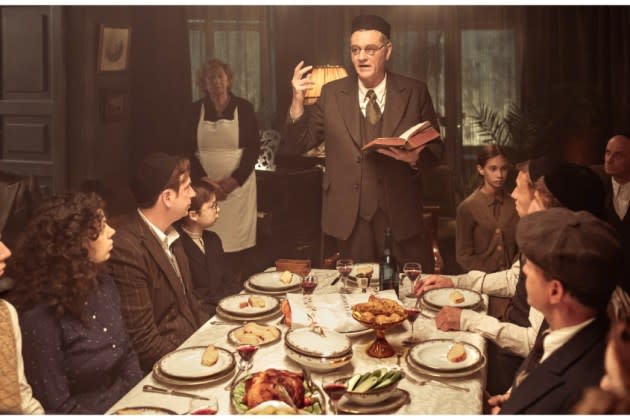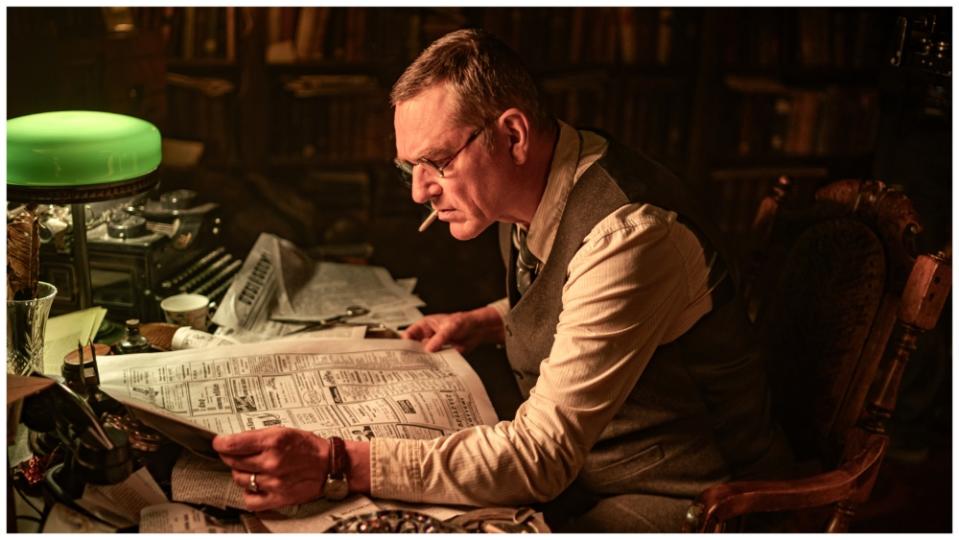Klaus Haro Shines Light on Deportation of Jews From Finland in ‘Never Alone,’ First Look at World War II Drama (EXCLUSIVE)

Sometimes films highlight little-known events in their country of origin that wind up catalyzing a re-evaluation of their nation’s history. Finnish director Klaus Härö’s “Never Alone” is shaping up to be that sort of film. It follows the deportation from Finland of eight Austrian-Jewish refugees by the Gestapo during World War II and the work of Abraham Stiller, a pillar of the Helsinki Jewish community, who tried to stop it from happening.
Despite Finland’s uneasy alliance with Nazi Germany during the early years of the war, Jewish citizens of Finland had their government’s protection in spite of some Finnish officials who would have preferred to comply with the Gestapo’s requests to expel them all.
More from Variety
It’s the first cinematic treatment of this subject, which producer Ilkka Matila says was too painful a story for the Finnish state and the entire society to speak about publicly. Moreover, Matila points out, it is a narrative with immense contemporary resonance. “The issues being discussed today are the same as in the film: who are these people and why should we help them?”
The Finland-Estonia-Sweden-Germany-Austria production is penned by Härö from a story he wrote with screenwriter Jimmy Karlsson, a longtime collaborator. It’s freely based on the book “Uncle Stiller” by Finnish journalist Rony Smolar as well as real events. Munich-based The Playmaker is the sales agent.
Interiors are currently shooting in Tallinn before the production returns to Helsinki. Matila expects 33 shooting days for the film’s 91 scenes, with post-production completed in 2024.
The first eight days of shooting took place in a black box studio in Estonia where talented production designer Jaagup Roomet created in exquisite period detail the comfortable Helsinki home of Abraham and Vera Stiller. The couple are played by Ville Virtanen (known internationally for the detective series “Bordertown”) and Nina Hukkinen. Watching the actors and ace cinematographer Robert Nordström (who shot Härö’s previous film, “My Sailor, My Love,” currently on release in the U.S.) and his crew at work under Härö’s exacting eye, one can see the lush visual style that the helmer is known for taking shape.
The tall, serious Virtanen projects an impressive gravity and confidence well-suited to Stiller, who believed his connections in Helsinki’s 2000-strong Jewish community and among the local bourgeoisie and government officials would carry the day. The actor, who first met Härö many years ago when he performed in his film school project, notes that one of the challenging aspects of his role is having to speak Finnish, Swedish, German, Yiddish, Hebrew and Russian.

Matila, half-jokingly, refers to Härö, who comes from Finland’s Swedish-speaking minority, as the Finnish Steven Spielberg. It’s not a bad comparison. Like Spielberg, Härö is a man of faith (albeit Christian) and is known for his ability to wrap important topics in well-acted, smoothly-crafted dramas that entertain and educate, along with moments of heightened sentiment that honestly earn their tears.
In films such as “Mother of Mine” (2005) and “The New Man” (2007), Härö dealt with painful episodes in Finnish and Swedish history respectively. Meanwhile, the Golden Globe nominated “The Fencer” (2015) drew on the life of legendary Estonian fencing master Endel Nelis, to create a period piece unfolding under a cloud of suspicion and paranoia fostered by the postwar Soviet occupation.
Härö says his strong Christian faith drew him to Stiller’s story, which has been his passion project for many years. He recalls that after the release of “Mother of Mine” he and Matila talked about what their dream project would be and to their mutual surprise, each said it would be something about the Jewish deportations.
Why that subject? Härö remembers learning about the Holocaust in middle school as a formative experience, while Matila recalls a book about the deported and their fate coming out in the 1970s and rattling Finnish society.
It took Härö some time to find the key to telling the story, but he found that it emerged naturally through a focus on Stiller and his relationship with the young Austrian-Jewish couple Georg and Janka Kollman (Austrian actors Rony Herman and Naemi Latzer) and the villain of the piece, the openly anti-Semitic and pro-Nazi Arno Anthoni, director of the Finnish State Police.
Finland is fielding a strong contender for the international feature Oscar this year with Aki Kaurismäki’s “Fallen Leaves.” If Härö’s work, which has represented Finland four times in the past, is selected as the international feature entry in 2024, then one can safely bet that Finland will be on a roll.
Best of Variety
Sign up for Variety’s Newsletter. For the latest news, follow us on Facebook, Twitter, and Instagram.

